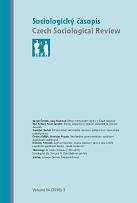Zdroje institucionální důvěry v České republice
Sources of Trust in Institutions in the Czech Republic
Author(s): Jana Stachová, Daniel ČermákSubject(s): Social Sciences
Published by: AV ČR - Akademie věd České republiky - Sociologický ústav
Keywords: trust in institutions; political institutions; logistic regression; lifetimelearning model; Czech Republic
Summary/Abstract: This article sets out to identify the factors that can help explain trust in selected political institutions in the Czech Republic – the Government, the Chamber of Deputies and the Senate of the Parliament of the Czech Republic, regional assemblies, and municipal assemblies – and determine what kind of influence certain factors have on the overall level of trust in the population. The life-time learning model devised by the American sociologists Mishler and Rose, who combine cultural and institutional approaches to explain trust in institutions, was used as the theoretical framework for this investigation. Logistic regression models were created for each of the observed institutions. The data used to build the models were drawn from a series of surveys conducted under the ‘Czech Society’ project by the Public Opinion Research Centre at the Institute of Sociology of the Academy of Sciences. The results of the logistic regression analyses showed that the particular level of trust in an institutions is influenced more by institutional performance (and this influence most pronounced in the case of the Government and the Chamber of Deputies) than by the effect of socialisation within the predominant political culture, which was not very strong. Nevertheless, the effect of culturally dependent variables such as gender and religious confession is not negligible.
Journal: Sociologický časopis / Czech Sociological Review
- Issue Year: 46/2010
- Issue No: 05
- Page Range: 683-717
- Page Count: 35
- Language: Czech

